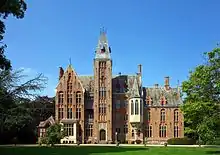
The Loppem Coup (French: Coup de Lophem, Dutch: Coup van Loppem) or Loppem Agreement (Pacte de Lophem, Akkord van Loppem) refers to a series of private meetings held by King Albert I at the Castle of Loppem in Loppem (Lophem), West Flanders on 11 to 14 November 1918 about the future political order in Belgium after the end of World War I.[1] The term originated among conservative Catholic critics who denounced the King's actions as an unconstitutional "coup d'état".
Convened in the aftermath of the Armistice of 11 November 1918 in the days before the King's triumphant return to Brussels which had been occupied since 1914, the Loppem meetings consisted of a series of private audiences with prominent socialist and liberal politicians and notables such as Edward Anseele, Paul-Émile Janson, and Émile Francqui who had become prominent in German-occupied Belgium. A number of sensitive political topics were discussed, including universal male suffrage, labour rights, and the status of Dutch language, notably in higher education.
The meetings preceded the creation of a national unity government under Léon Delacroix on 21 November, sometimes referred to as the Loppem Government (gouvernement de Lophem, or regering van Loppem), which included liberals and socialists and marked the end of nearly four decades of exclusive Catholic political dominance in Belgian politics.[2] The following day, 22 November, the King re-entered Brussels and announced a new legislative programme to include the abolition of the pre-war electoral system of plural voting and the creation of a university whose teaching would be conducted in Dutch.
The new measures appalled conservative Catholics who had been absent from the discussion at Loppem and who succeeded in delaying some of the new reforms. On learning of the consultations, some radicals denounced it as a "coup" in which the King, either at his own initiative or under socialist pressure amid the November Revolution in Germany, had overstepped his constitutional powers to favour the political left. The King was forced to issue a public letter on 10 February 1930 clarifying his account of the discussions.
See also
- Red Week (Netherlands), socialist unrest in 9-14 November 1918
References
- ↑ "Entrevue de Lophem, 11 - 14 novembre 1918". 14-18 Brussels.
- ↑ Delcorps, Vincent (2014). "Loppem Coup". International Encyclopedia of the First World War. Retrieved 15 August 2021.
Further reading
- Dumoulin, Michel (2006). La démocratie rêvée, bridée et bafouée (1918-1939). Nouvelle histoire de Belgique. Bruxelles: Editions Complexe. ISBN 2-8048-0083-0.
- Haag, Henri (1975). "Le témoignage du Roi Albert sur Loppem (Février 1930)". Bulletin de la Commission royale d'Histoire. 141 (1): 313–347. doi:10.3406/bcrh.1975.1389.
- Velaers, Jan (2020). "Un coup d'État à Loppem ? Le roi Albert, le suffrage universel pur et simple et la Constitution". « À l’œuvre donc, Messieurs ! » Sept conférences sur la Belgique après la Grande Guerre (PDF). Senate of Belgium. pp. 2–19. Retrieved 5 August 2023.